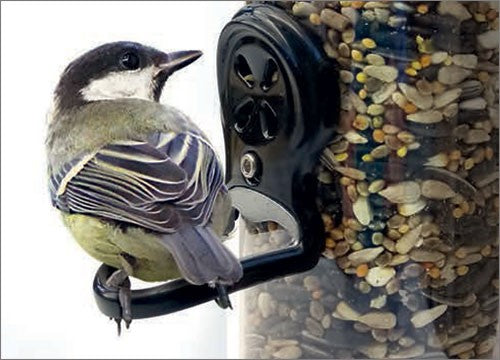
What to Feed Garden Birds and What to Avoid: A Handy Guide
Share
We all know what to feed our garden birds, don’t we? Read on to find out what you shouldn't be feeding the birds.
Sunflowers, peanut granules and niger seeds are all bird favourites. Millet seed will attract sparrows, finches, and doves, and are in many blends. Blue Tits and greenfinches prefer to peck at peanuts. Blackbirds enjoy flaked maize. But, there are certain foods to avoid.
For instance, did you know that fat from the roasting tin is bad for birds? This fat is mixed with juices from the meat and - when allowed to set - the consistency is not safe for birds feathers. Beef suet and lard on their own are suitable as they re-solidify after warming. It’s important to know the difference.

Never give milk to any bird (or hedgehog). A bird’s stomach is not designed to digest milk. Consuming milk can cause serious stomach upsets. Fermented dairy products such as cheese, when grated, is enjoyed by robins and wrens. You might think that birds can determine what’s safe to drink; yet, pigeons will drink from a hot tub!
Desiccated coconut shouldn’t be offered as it can swell inside a bird and cause death. Supply fresh coconut only, in the shell. That said, it’s easier to feed suet from a coconut shell.
Vegetable oil and polyunsaturated margarine are also unsuitable. Birds, unlike humans, need very high levels of saturated fat. Such as raw suet and lard. These help build up birds energy levels and powers them through winter. Soft fat, once smeared on feathers, destroys the waterproofing qualities. This of course would be disastrous.
Porridge oats mustn’t be cooked before presenting to birds. Cooking turns the oats glutinous and can harden beaks and plumage. But, uncooked porridge oats are healthy for many birds. Especially blackbirds, robins and starlings.
Broken dry biscuits are not desirable either as garden birds can choke on hard lumps. They offer little in the way of energy. Beware as dog biscuits are sometimes added to cheap seed mixtures, to ‘bulk’ them out. If in doubt, check with your bird seed supplier.
Stale and mouldy food can also be harmful to birds and cause respiratory infections. Always remove any stale or mouldy food immediately. Stale food is a breeding ground for salmonella, which can cause food poisoning. If the food on your bird table, or in your feeder turns mouldy, it could be that you are feeding too much food at once. If so, reduce the amount you put out and put this out daily. Enough for a days feeding is ideal.
We receive many enquiries about peanuts. They are popular with house sparrows, siskins and greenfinches amongst others. They’re full fat. But that’s fine for the birds as their main job is to build up their energy levels. A significant word of warning about peanuts – never feed salted or dry roasted peanuts. They contain high quantities of salt and that’s amongst the last thing your birds need in a bird diet. Poor quality peanuts can contain aflatoxin, which can kill birds. We say that you should always buy your peanuts from a reputable source. And they must be aflatoxin free (nil detectable).
Here at Haith’s, we are passionate about garden bird welfare. And we’re here to help you give goodness back to nature whatever the weather. Feel free to contact us if you’d like more help choosing the best food for your birds.
Written by Angela & Chris
